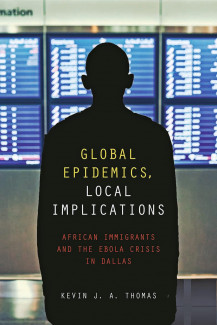
Johns Hopkins UniversityEst. 1876
America’s First Research University
America’s First Ebola Outbreak and the Response Towards African Immigrants in Dallas

Alim, an immigrant from Liberia, was quick to realize why fewer passengers were using his services as an airport-shuttle driver at the Dallas Fort Worth airport. A few weeks earlier, Thomas Duncan, a native of Liberia, had died of Ebola at a hospital in Dallas; he was the first person known to die of the disease on U.S. soil. The response to Duncan’s death was dramatic and it increased local fears about the consequences of contracting the deadly virus. It did not take long for African immigrants to be stigmatized in Dallas and other American communities. Few people wanted to be around them because they were seen as potential carriers of the virus. Their race was just one factor used to identify them as the targets of stigma. As Alim recalled, people could tell from his accent that he was from Africa, and as a result, it was difficult to get passengers to board his vehicle.
About a year earlier, in December 2013, an Ebola outbreak started in the village of Meliandou in Guinea and subsequently became the world’s largest Ebola epidemic. Although the epidemic led to the death of thousands of people in West Africa, it was not until October 2014 that the first community responses to the outbreak were observed in America. Triggered by the death of Thomas Duncan, they were seen in the widespread fear of contracting Ebola among locals and in the spirited debates that occurred among politicians. For the most part, however, these responses were not surprising. As noted in accounts of epidemics linked to the Bubonic Plague, Typhoid, SARS, and other infectious diseases, the focus of these reactions is usually on immigrant groups linked to the communities where the outbreaks started.
Not content with media accounts of the experiences of Africans in Dallas during the Ebola epidemic, I conducted my own research to understand these issues further. As I document in my book, Global Epidemics, Local Implications: African Immigrants and the Ebola Crisis in Dallas, many of the social responses I discovered were surprising. There is no question that African immigrants had many encounters with stigma. Yet, as I argue in the book, accounts that solely focus on these negative responses can be limiting. For one, they ignore the totality of the responses observed in immigrant communities during epidemics. More importantly, they understate the ways in which immigrants act to counter the consequences of the spread of disease.

Lost in the narrative of the 2014 Ebola epidemic, for example, is the fact that African immigrants in Dallas took the initiative to promote public health interventions to prevent the spread of the virus. They imposed quarantines on people returning from visits to affected African countries, discouraged the practice of hand-shaking to prevent contact with infected persons, and promoted the use of chlorine-based solutions to wash hands. They also took action to address other related issues. For example, in order to respond to the stigma of Ebola, they conducted public information campaigns about the disease and threatened legal action to counter the anti-African prejudice they encountered. At the same time, they raised funds to help affected communities in West Africa, partnered with other Americans to increase awareness of the disease, and intervened to improve the lives of those affected by the disease in Dallas.
Such pro-social responses are largely missing from previous studies on the experiences of immigrants linked to global epidemics. When this occurs, our attention is mostly drawn to the ways in which immigrants are ostracized in their local communities. As I observe in my book, however, immigrants affected by global epidemics are more than just victims. They do not stand by and allow the negative consequences of epidemics to destroy the social fabric of their communities. Instead, they take deliberative action to counter these experiences, while addressing the effects of epidemics in their countries of origin.
Undaunted by the stigma he experienced on his job, Alim worked with other Liberians in Dallas to raise funds to purchase an ambulance for Liberia. The vehicle arrived in the country at the height of the epidemic and at a time when few alternatives were available for transporting Ebola patients to hospitals. “Ebola is a fast-moving disease”, Alim recalled, as he described why the ambulance was needed. He also maintained that the assistance they sent from the U.S. gave these patients a better chance of survival; as he put it, the ambulance “would go faster and take them to the hospital”. Despite their own negative experiences, African immigrants in Dallas were acting to save lives affected by Ebola in Africa.
Order Global Epidemics, Local Implications: African Immigrants and the Ebola Crisis in Dallas – published on December 17, 2019 – at the following link: https://jhupbooks.press.jhu.edu/title/global-epidemics-local-implications
Kevin J. A. Thomas is a professor of sociology at the Pennsylvania State University. He is the author of Global Epidemics, Local Implications: African Immigrants and the Ebola Crisis in Dallas, Contract Workers, Risk, and the War in Iraq: Sierra Leonean Labor Migrants at US Military Bases, and Diverse Pathways: Race and the Incorporation of Black, White, and Arab-Origin Africans in the United States.



